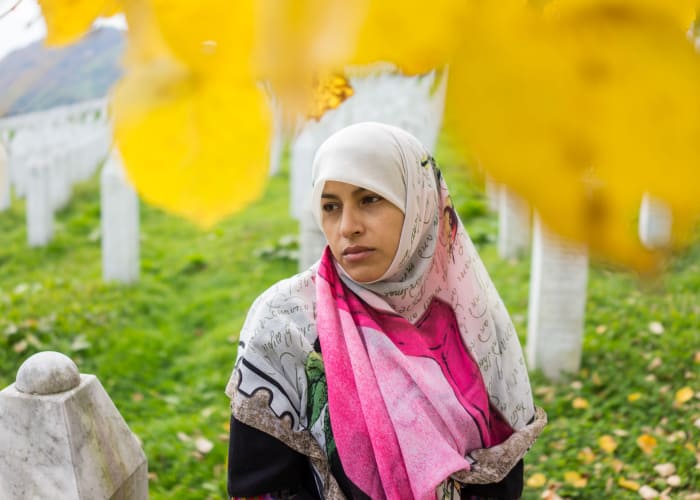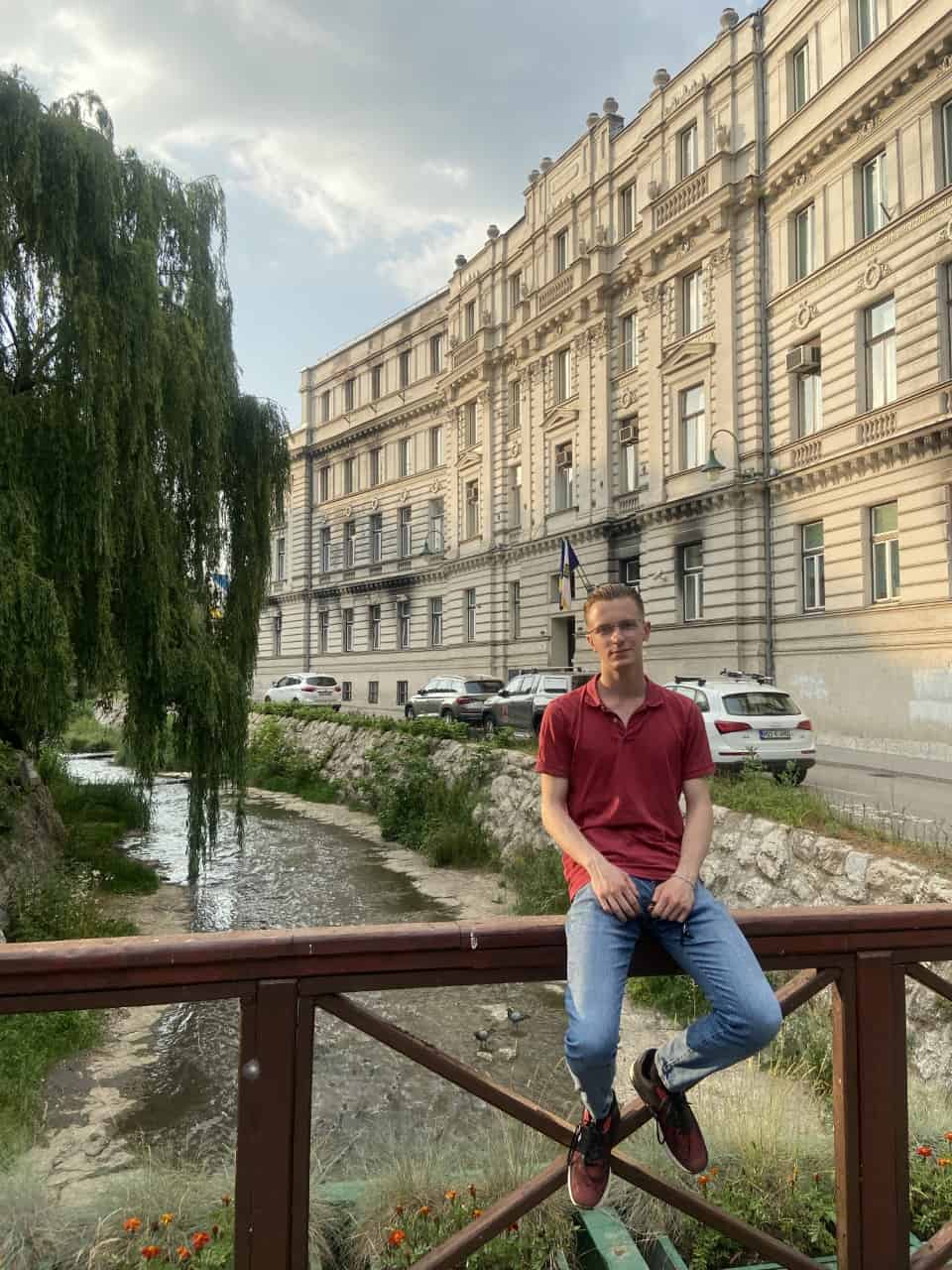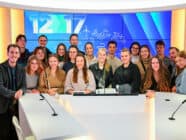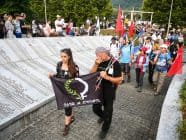
A young woman at the Srebrenica–Potočari Memorial and Cemetery for the Victims of the 1995 Genocide. Image from Shutterstock.
Almost 30 years after the end of the war in Bosnia and Herzegovina, young people living in the country say they are still being impacted by ongoing ethnic conflicts and hostilities.
Nearly 100,000 people are thought to have died in the conflict in the 1990s. With a multi-ethnic population comprising Bosniaks (Bosnian Muslims), Serbs, and Croats, the former republic of Yugoslavia saw years of bitter fighting that involved the three Bosnian groups as well as the Yugoslav army, until Western countries, backed by the North Atlantic Treaty Organization, imposed a negotiated cease-fire in 1995.
But some young people feel the country is still divided, and they are advocating for change and for their perspectives to be heard and considered.
During a study excursion funded by the Erich Brost Institute for International Journalism, I spoke with Arnes Jeleč, a student and the coordinator of the youth department of the Social Democratic Party of Bosnia and Herzegovina in Sarajevo Canton. We discussed the difficult political and economic conditions for young people in Bosnia and Herzegovina and why he is committed to a better future.
What role do ethnicity and religion play in the conflicts affecting you and other young people?

Arnes Jeleč, coordinator of the youth department of the Social Democratic Party of Bosnia and Herzegovina. Photo by Richard Brandt
Religion is linked to ethnic identity here. The fact that I am Bosniak also means that I am Muslim. So, identities such as Bosniak and Muslim, Croat and Catholic, or Serb and Orthodox are very closely linked. It is difficult to separate them. But people are not always practising believers. If someone attacks Islam, I will defend Islam, not because I pray five times a day and God is so important to me, but because someone attacked what I feel is part of my identity. Something that I grew up with. Something that my parents are. That’s true of all ethnic groups.
All my known ancestors, up to my great-grandparents, are Bosniaks. But my last name is Croatian, so I probably have Croatian roots. I feel that young people are more liberal and less conservative, but they still carry that religious identity.
What role do government and political leadership play in fueling the rifts between ethnic groups?
Every problem in Bosnia and Herzegovina has a political or historical background. I keep hearing people say, “It’s the politicians who are dividing the country, that is, the politicians who are nationalists.” We do indeed have politicians in power who are nationalists. But we still live in a democratic country where one’s vote really counts. We don’t live in a country where elections are staged. They are manipulated, but there is a limit to which they can be manipulated. We do not live in a country where politicians cannot be replaced. And who elects the politicians? We do! We elect the nationalist politicians who divide us.
There are people who elect such politicians because they say, “I don’t care if a politician is corrupt; at least he belongs to me. He protects me from everyone else.” It is better to have a corrupt Bosniak than a good Croat or Serb. And this is true for any ethnic group. But many people don’t admit that.
Would you say that young people in Bosnia and Herzegovina are politically engaged?
No, young people are very passive. Some do go to the polls, but young people generally don’t exercise their democratic rights. Many don’t know who they can vote for and what levels of government there are. When it comes to political activism outside of elections, the numbers are also low. Young people don’t know what role the municipality, the canton, the Federation of Bosnia and Herzegovina or the political divisions play.
Why is it important to get involved politically and work to come to terms with Bosnia and Herzegovina’s history?
I don’t talk about the war because I like it. I am talking about the war because half of the country is still revising history. Republika Srpska has its own education system, which is completely different from others. Not only when it comes to the war in the 1990s, but everything: the constitution of our country, the nature of the war, the crimes, even the time before Yugoslavia was founded. This is a big problem. I think we need to talk about it. Because as long as revisions take place, you have to fight for the truth. You can’t just give up on that.
What are some of the practical impacts of the conflicts on young people? For example, how is it affecting immigration and employment?
Young people leave the region because they can’t find work due to corruption. So, we have a situation where a young person, for example, is studying medicine, working hard, and has a master’s degree. Does everything they need to do to become a doctor but are unable to work as a doctor.
In any normal country, they would at least get a chance to work in a medical institution. That is not the case here – unless someone has a cousin or someone who can open the door. That’s completely normal. But also, if you get a job, the wages are low. There are no workers’ rights, and you rarely have time off. It’s just very difficult working conditions. That’s why many young people decide to go to Austria or Germany. It is better to work as a waiter in Germany than to be a waiter in Bosnia and Herzegovina.
Now, however, the situation is even more dramatic. It is not only the young people who are leaving the country. It’s not even just people who can’t find work. We are dealing with a situation where even wealthy people who can get everything they need in Bosnia and Herzegovina leave the country because they don’t want their children to grow up in a nationalist environment.
Opinions expressed on this website are those of the authors alone and do not necessarily reflect or represent the views, policies or positions of the EJO or the organisations with which they are affiliated.
If you liked this story, you may also be interested in: Student Perspective: Tackling hate speech and the harmful narratives of war in Bosnia and Herzegovina
Tags: Bosnia and Herzogovina, Bosnian War, Ethnic conflicts, journalism students












































